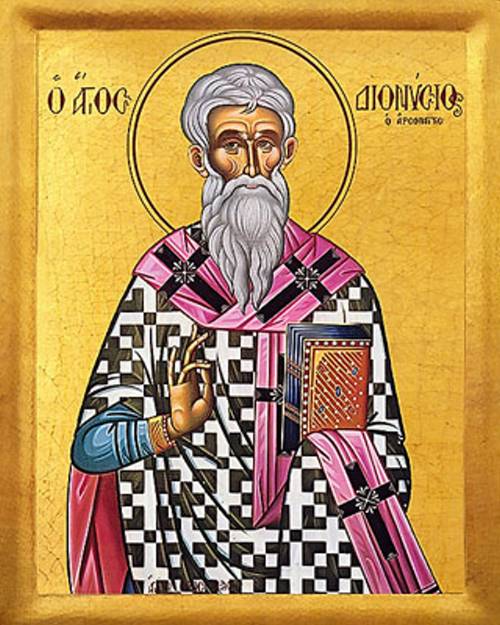Mystical Theology
Chapter 1
Thus the blessed Bartholomew asserts that the divine science is both vast and minute, and that the Gospel is great and broad, yet concise and short; signifying by this, that the beneficent Cause of all is most eloquent, yet utters few words, or rather is altogether silent, as having neither (human) speech nor (human) understanding, because it is super-essentially exalted above created things, and reveals itself in Its naked Truth to those alone who pass beyond all that is pure or impure, and ascend above the topmost altitudes of holy things, and who, leaving behind them all divine light and sound and heavenly utterances, plunge into the Darkness where truly dwells, as the Oracles declare, that ONE who is beyond all.(3)
Post 3 Dionysius the Aeropagite
What follows is the legend of Dionysius taught by some Orthodox Churches. Interesting and fanciful, yet keep in mind the infallible words of Pope Benedict XVI previously posted.
The Hieromartyr Dionysius the Areopagite, Bishop of Athens St Dionysius lived originally in the city of Athens. He was raised there and received a classical Greek education. He then went to Egypt, where he studied astronomy at the city of Heliopolis. It was in Heliopolis, along with his friend Apollophonos where he witnessed the solar eclipse that occurred at the moment of the death of the Lord Jesus Christ by Crucifixion. “Either the Creator of all the world now suffers, or this visible world is coming to an end,” Dionysius said. Upon his return to Athens from Egypt, he was chosen to be a member of the Areopagus Council (Athenian high court).
When the holy Apostle Paul preached at the place on the Hill of Ares (Acts 17:16-34), Dionysius accepted his salvific proclamation and became a Christian. For three years St Dionysius remained a companion of the holy Apostle Paul in preaching the Word of God. Later on, the Apostle Paul selected him as bishop of the city of Athens. And in the year 57 St Dionysius was present at the repose of the Most Holy Theotokos.
During the lifetime of the Mother of God, St Dionysius had journeyed from Athens to Jerusalem to meet Her. He wrote to his teacher the Apostle Paul: “I witness by God, that besides the very God Himself, there is nothing else filled with such divine power and grace. No one can fully comprehend what I saw. I confess before God: when I was with John, who shone among the Apostles like the sun in the sky, when I was brought before the countenance of the Most Holy Virgin, I experienced an inexpressible sensation. Before me gleamed a sort of divine radiance which transfixed my spirit. I perceived the fragrance of indescribable aromas and was filled with such delight that my very body became faint, and my spirit could hardly endure these signs and marks of eternal majesty and heavenly power. The grace from her overwhelmed my heart and shook my very spirit. If I did not have in mind your instruction, I should have mistaken Her for the very God. It is impossible to stand before greater blessedness than this which I beheld.”
After the death of the Apostle Paul, St Dionysius wanted to continue with his work, and therefore went off preaching in the West, accompanied by the Presbyter Rusticus and Deacon Eleutherius. They converted many to Christ at Rome, and then in Germany, and then in Spain. In Gaul, during a persecution against Christians by the pagan authorities, all three confessors were arrested and thrown into prison. By night St Dionysius celebrated the Divine Liturgy with angels of the Lord. In the morning the martyrs were beheaded. According to an old tradition, St Dionysius took up his head, proceeded with it to the church and fell down dead there. A pious woman named Catulla buried the relics of the saint.



Recent Comments